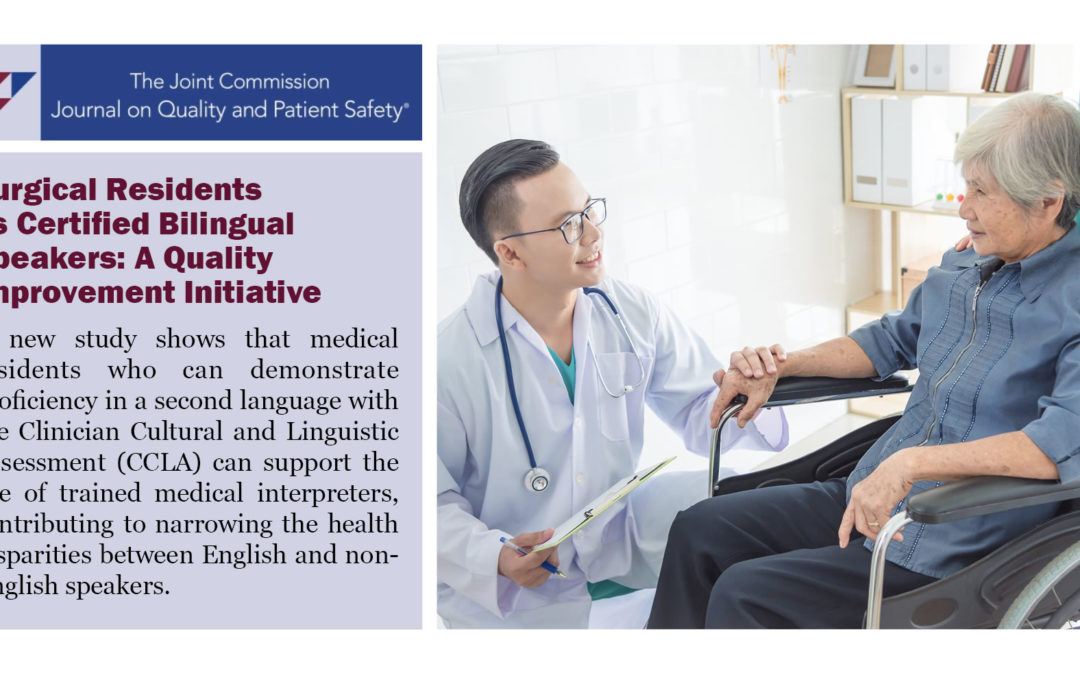Communication between patients and health care professionals is essential to the safe and effective delivery of health care. More than 60 million residents of the United States speak a language other than English at home, with approximately 22% self-identifying as either speaking English “not well” or not speaking English “at all,” according to the U.S. Census Bureau.1
A new improvement brief in the June issue of The Joint Commission Journal on Quality and Patient Safety details a quality improvement initiative to identify general surgery residents proficient in a non-English language and have each attempt the Clinician Cultural and Linguistic Assessment (CCLA) to become qualified bilingual staff speakers.
In the study “Surgical Residents as Certified Bilingual Speakers: A Quality Improvement Initiative,” general surgery house staff at Johns Hopkins Hospital in Baltimore were asked to self-identify as proficient in a language other than English. All residents responded to the initial survey, with 18 out of 65 reporting a non-English language proficiency.
Of the 12 residents who sat for the CCLA exam, nine (75%) passed, with five certifying in the most commonly spoken non-English languages at the academic medical center. The number of certified residents increased from one to 10. Fees for the exam were waived and each resident was excused from clinical duties to complete the exam.
“Residents care deeply about the patients they care for, yet are often very busy. Speaking to patients with limited English proficiency in their own languages helps residents build rapport with patients and saves time. This study demonstrates how this can be done in a safe and standardized fashion. Lowering the barriers to certification without lowering the standards for certification helps residents promote culturally sensitive, high quality and equitable patient care. Resident quality improvement projects are key components of their education and can help lead to change for institutions,” says Elliott R. Haut, MD, PhD, FACS, vice chair of Quality and Safety for Surgery and co-author of the paper.
“Initiatives like this one are an important piece of a larger puzzle that must include multiple complementary modalities for language access with both clinic- and systems-level components, including qualified interpreters to be able to offer limited English proficient (LEP) patients a consistently high standard of care,” notes Lisa C. Diamond, MD, MPH, in an accompanying editorial.
Also featured in the June issue:
- “Introducing CiteScore, Our Journal’s Preferred Citation Index: Moving Beyond the Impact Factor” (An editorial from The Joint Commission Journal on Quality and Patient Safety)
- “Safely Practicing in a New Environment: A Qualitative Study to Inform Physician Onboarding Practices” (In-depth interviews with 20 physicians from six specialties)
- “Impact of EMR Automated Results Routing Tool Implementation on Notification of Inpatient Endoscopy Biopsy Results” (University of California, Davis Medical Center, Sacramento, California)
- “Using Provider Incentives and an Opt-out Strategy in a Successful Quality Initiative to Increase Chlamydia Screening” (The Children’s Health Center, San Francisco)
- “Achieving 70% Hypertension Control: How Hard Can It Be?” (University of Colorado School of Medicine, Aurora, Colorado)
- “Validation of a Secondary Screener for Suicide Risk: Results from the Emergency Department Safety Assessment and Follow-up Evaluation (ED-SAFE)” (Analysis of eight emergency departments across nation)
- “Leveraging Health Information Technology to Meet The Joint Commission’s Standard for Measurement-Based Care: A Case Study” (Inova Kellar Center, Fairfax, Virginia)
- “Integrating Epidemiological Information into MRI Reports Reduces Ensuing Radiologic Testing Costs Among Patients with Low Back Pain: A Controlled Study” (Data from 6,904 patients enrolled in Excellus BlueCross BlueShield, Rochester, New York)
For more information, visit The Joint Commission Journal on Quality and Patient Safety website.
1U.S. Census Bureau. Language Use in the United States: 2011. Ryan C. Report No. ACS-22. Aug 2013. (Updated: Nov 9, 2018.) Accessed Feb 20, 2020. https://www.census.gov/ library/publications/2013/acs/acs-22.html.









